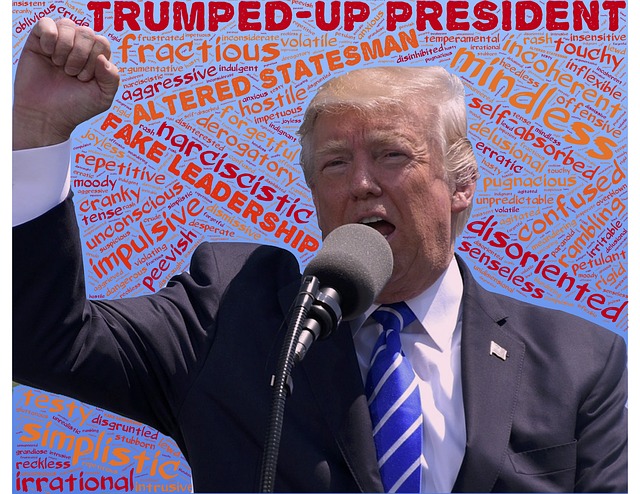Trump to Veterans: Traumatic brain injuries are like ‘headaches’ – ‘not very serious injuries’
BALTIMORE — Three years into this ulcerous presidency, it’s become clear Donald Trump wouldn’t know the difference between a headache and a traumatic brain injury if he saw one – and wouldn’t tell America the truth about it, even if he did know.
If you doubt this, then you’ve been too caught up in the dangerous Trumpian retaliations of the past week: the firing of a war hero, Lt. Col. Alexander Vindman, and others for daring to tell the truth under oath; the attempt to subvert the sentencing of Trump pal Roger Stone for lying to Congress and attempting to scare off a witness; and the ensuing resignations from the Stone case of four Dept. of Justice prosecutors.
It’s enough to give the entire nation a headache.
But it’s taken our attention away from more than 100 U.S. service members who have now been diagnosed with traumatic brain injuries from the Iranian ballistic missile attack last month at al-Asad Air Base in Iraq.
The diagnoses have also contradicted President Trump’s dismissal of the injuries as “not very serious” – even as Pentagon officials acknowledged that service members were being studied for possible brain injury.
The Pentagon first announced 50 cases of traumatic brain injury, and then upped it to 64 and then, last week, said the total was 109. Officials also said some symptoms won’t become apparent for a year or two.
“I heard they had headaches,” the president blithely announced. “I don’t consider them very serious injuries relative to other injuries I have seen.”
This, from the hero of the Vietnam era’s Battle of the Bone Spurs.
The Iranian attack on U.S. troops was retaliation for the American drone strike that killed Qassim Suleimani, a top Iranian general, on Jan. 3. The Trump administration first claimed there were no U.S. injuries from the Iranian attacks.
It was the president’s way of minimizing the damage – and hopefully, nullify the need to further retaliate against Iran, and possibly lead to a wider conflict.
No harm, no foul.
But Trump’s “headache” remarks set off some furious responses.
“It’s plain wrong for President Trump to diminish their wounds,” said Senator Jack Reed, the Rhode Island Democrat who served as an officer in the 82nd Airborne Division. Reed is the ranking Democratic member on the Armed Services Committee.
“President Trump’s comments,” said Reed, “were an insult to our troops. He owes them an apology.”
“Don’t just be outraged by #President Mayhem’s latest asinine comments,” Paul Rieckhoff, the founder of Iraq and Afghanistan Veterans of America, wrote on Twitter. “Take action to help vets facing TBIs.”
TBI – that’s shorthand for traumatic brain injury. In all the years since the terrorist attacks, and America’s ongoing wars, we’ve seen enough of such damage to give it a nickname.
But the effects can be long-lasting – and awful. I’ve witnessed it in numerous interviews I’ve done over the years at the Walter Reed Army Hospital.
Try conversing with some of these TBI victims suffering the worst. You ask them a question, and you witness their tortured struggle. Long moments go by as they attempt to make sense of simple words, and then more moments of silence, and you imagine the wheels slowly turning inside their heads until finally, finally, a few words of response stagger out of their mouths.
Some “headache,” Mr. President.
There’s been no apology from Trump, of course. He’s been too busy over the past week– retaliating against those who dared to tell the truth under oath, and trying to subvert justice for a pal who lied under oath.
That’s America’s latest “headache,” which feels like the latest shock to our brains.

Michael Olesker, columnist for the News American, Baltimore Sun, and Baltimore Examiner has spent a quarter of a century writing about the city he loves.He is the author of several books, including Michael Olesker’s Baltimore: If You Live Here, You’re Home, Journeys to the Heart of Baltimore, and The Colts’ Baltimore: A City and Its Love Affair in the 1950s, all published by Johns Hopkins Press.

